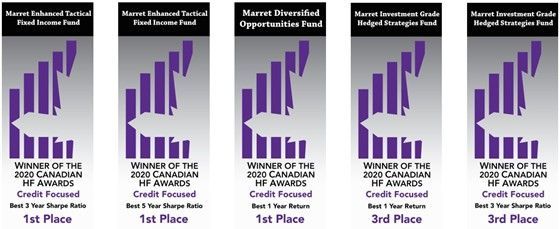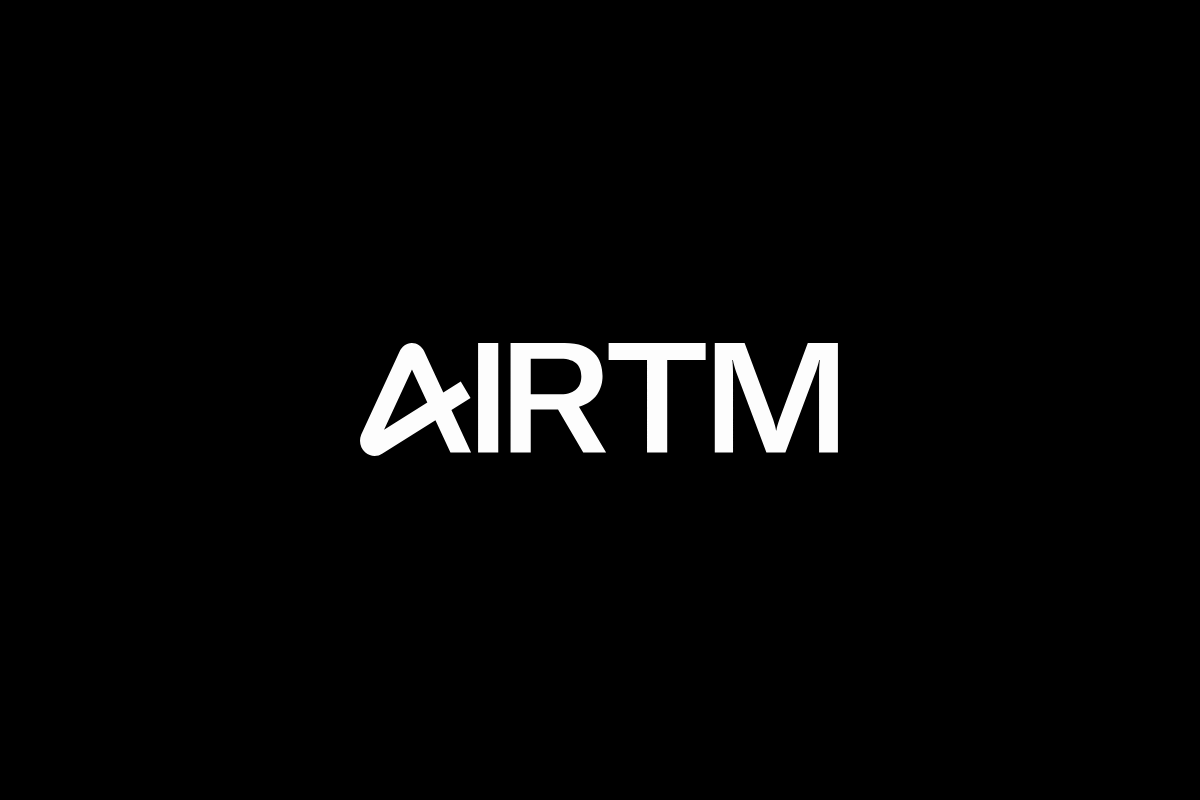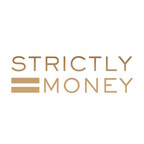Fintech
Marret Receives a Total of Five Awards at the 2020 Canadian Hedge Fund Awards

Toronto, Ontario–(Newsfile Corp. – October 21, 2020) – Marret Asset Management Inc. is pleased to announce that all three of their nominated funds received a total of five awards at the 2020 Canadian Hedge Fund Awards held on October 20, 2020.
The annual Canadian Hedge Fund Awards, organized by Alternative IQ, help investors identify the best performing hedge funds by recognizing winners in 5 performance measures within specific hedge fund categories. The awards are based solely on quantitative performance data to June 30th, with Fundata Canada collecting and tabulating the data to determine the winners.
In the Credit Focused category, Marret’s Enhanced Tactical Fixed Income Fund was awarded 1st place in both 3-year and 5-year Sharpe ratio. Marret Diversified Opportunities Fund was awarded 1st place in 1-year return. Marret Investment Grade Hedged Strategies Fund won 3rd place in 1-year return and 3rd place in 3-year Sharpe ratio.
| 2020 Canadian Hedge Fund Awards | Credit Focused Category | |
| Marret Enhanced Tactical Fixed Income Fund | 1st place 3-year and 5-year Sharp ratio |
| Marret Diversified Opportunities Fund | 1st place 1-year return |
| Marret Investment Grade Hedged Strategies Fund | 3rd place 1-year return, 3rd place 3-year Sharp ratio |
“We are honoured to receive these awards. What is really important to us at Marret is trying to achieve the best risk-adjusted returns over the long term, and receiving these awards is very much in line with this goal,” said Paul Sandhu, President and CEO of Marret Asset Management Inc.
To view an enhanced version of this graphic, please visit:
https://orders.newsfilecorp.com/files/7474/66552_figure1.jpg
Marret Asset Management Inc. is a specialist fixed income manager that utilizes dynamic investment processes which aim to deliver favorable risk return outcomes across its strategies. Founded in 2001, the firm is led by Paul Sandhu, who has over 30 years of domestic and international fixed-income experience. Marret offers a full spectrum of corporate credit investing strategies covering government securities, investment grade, high yield, short term cash alternatives, and opportunistic fixed income strategies for both core and alternative allocations. In 2013, Marret Became a 65% owned subsidiary of CI Financial Corporation.
Mark Culver
President, Marret Private Wealth
E: [email protected] | T: (514) 875-3384
Roberto Katigbak
Institutional Strategist, Head of Sales & Marketing
E: [email protected] | T: (514) 868-2191
Important Disclaimers
Past Performance:
Investment funds are not guaranteed. Their values change frequently, and past performance may not be repeated.
The Sharpe Ratio is a risk adjusted return measure. It is calculated by using standard deviation and excess return to determine reward per unit of risk. The higher the Sharpe Ratio, the better the portfolio’s historical risk adjusted performance.
The rates of return in the Sharpe Ratio are the historical annual compound total returns net of fees including changes in security value and reinvestment of all distributions and do not take into account sales, redemption, distribution or optional charges or income taxes payable by any securityholder that would have reduced returns.
Standard Deviation is widely used to measure risk in terms of the volatility of returns. It represents the historical level of volatility in returns over set periods. A lower standard deviation means the returns have historically been less volatile and vice versa. Historical volatility may not be indicative of future volatility.
Eligibility Of Award:
The Marret Enhanced Tactical Fixed Income Fund, the Marret Investment Grade Hedged Strategies Fund, and the Marret Diversified Opportunities Fund represent all Marret Funds which would have been under consideration for these awards. For further information please visit the Alternative IQ website at http://alternativeiq.com/canadian-hedge-fund-awards/categories/
General Disclaimer:
This information is being provided to you solely for your information. The information does not purport to contain all the information that may be necessary or desirable to fully and accurately evaluate an investment in the Funds, and is not to be considered as a recommendation by the Fund or Marret Asset Management Inc. that any person make an investment in the Fund. An investment in units of the Fund is speculative and involves a number of risks that should be considered by a prospective investor. Investors should consult their own professional advisor for specific investment advice tailored to their needs and based on the latest available information. Nothing in this document is or should be relied upon as a promise or representation as to the future.
Marret Asset Management Inc. is a partly owned subsidiary of CI Financial Corp. and an affiliate of CI Investments Inc. Published 10/20/2020
Fintech
Fintech Pulse: Your Daily Industry Brief (Chime, ZBD, MiCA)

As we close out 2024, the fintech industry continues to deliver headlines that underscore its dynamism and innovation. From IPO aspirations to groundbreaking regulatory milestones, today’s updates highlight the transformative power of fintech partnerships, regulatory evolution, and disruptive technologies. Here’s what you need to know.
Chime’s Quiet Step Toward Public Markets
Chime, the U.S.-based financial technology startup best known for its digital banking services, has taken a significant step by filing confidential paperwork for an initial public offering (IPO). As one of the most valuable private fintechs in the U.S., Chime’s move could potentially signal a renewed appetite for fintech IPOs in a market that has been cautious following fluctuating valuations across the tech sector.
With a valuation that reportedly exceeded $25 billion in its last funding round, Chime’s IPO could set a new benchmark for the industry. Observers note that its strong customer base and revenue growth may make it an appealing choice for investors seeking to capitalize on the digital banking boom. However, the timing and success of the IPO will depend on broader market conditions and the regulatory landscape.
Source: Bloomberg
ZBD’s Pioneering Achievement: EU MiCA License Approval
ZBD, a fintech company specializing in Bitcoin Lightning network solutions, has made history by becoming the first to secure an EU MiCA (Markets in Crypto-Assets Regulation) license. This landmark approval by the Dutch regulator positions ZBD at the forefront of compliant crypto-fintech operations in Europe.
MiCA, which aims to harmonize the regulatory framework for crypto-assets across the EU, has been a focal point for industry players aiming to establish legitimacy and expand their offerings. ZBD’s achievement not only validates its operational rigor but also sets a precedent for other fintech firms navigating the evolving regulatory landscape.
Industry insiders view this as a strategic advantage for ZBD as it broadens its footprint in Europe. By leveraging its regulatory approval, the company can accelerate its product deployment and establish trust with institutional and retail users alike.
Source: Coindesk, PR Newswire
The Fintech-Credit Union Synergy: A Blueprint for Innovation
The convergence of fintechs and credit unions continues to reshape the financial services ecosystem. Collaborative initiatives, such as the one highlighted in the recent partnership between fintech innovators and credit unions, are proving to be a potent force in delivering tailored financial solutions.
This “dream team” approach allows credit unions to leverage fintech’s technological expertise while maintaining their community-focused ethos. Key areas of collaboration include digital payments, personalized financial management tools, and enhanced loan processing capabilities. These partnerships not only enhance member engagement but also enable credit unions to remain competitive in an increasingly digital-first financial environment.
Industry analysts emphasize that such collaborations underscore a broader trend of traditional financial institutions embracing fintech-driven solutions to bridge service gaps and foster innovation.
Source: PYMNTS
Tackling Student Loan Debt: A Fintech’s Mission
Student loan debt remains a pressing issue for millions of Americans, and a Rochester-based fintech aims to offer relief through its cloud-based platform. This innovative solution is designed to simplify loan management and provide borrowers with actionable insights to reduce their debt burden.
The platform’s features include repayment optimization tools, personalized financial education, and seamless integration with loan servicers. By addressing the complexities of student loan management, this fintech is empowering borrowers to make informed decisions and achieve financial stability.
As the student loan crisis continues to evolve, solutions like this highlight the critical role fintech can play in addressing systemic financial challenges while fostering financial literacy and inclusion.
Source: RBJ
Industry Implications and Takeaways
Today’s updates underscore several key themes shaping the fintech landscape:
- Regulatory Milestones: ZBD’s MiCA license approval exemplifies the importance of regulatory compliance in unlocking growth opportunities.
- Strategic Partnerships: The collaboration between fintechs and credit unions demonstrates the value of combining technological innovation with traditional financial models to drive customer-centric solutions.
- Market Opportunities: Chime’s IPO move reflects a potential revival in fintech public offerings, signaling confidence in the sector’s long-term prospects.
- Social Impact: Fintech’s ability to tackle systemic issues, such as student loan debt, showcases its role as a force for positive change.
The post Fintech Pulse: Your Daily Industry Brief (Chime, ZBD, MiCA) appeared first on News, Events, Advertising Options.
Fintech
SPAYZ.io prepares for iFX EXPO Dubai 2025

Leading global payments platform SPAYZ.io has confirmed it will be attending iFX EXPO Dubai 2025 on 14 to 16 January. Exhibiting at Stand 64 at Trade Centre Dubai, SPAYZ.io’s team of professionals will be on hand providing live demonstrations of its renowned payment services for payment providers. Attendees will also receive exclusive insight into SPAYZ.io’s plans for 2025 alongside early early access to its upcoming plans for the new year.
SPAYZ.io delivers a host of payment solutions that leverage the latest technological innovations and open access to the fastest growing emerging markets across Africa, Europe and Asia. Over the past year, there has been huge demand for its Open Banking and local payment method services, alongside bank transfers, mass payouts, online banking and e-wallets.
Yana Thakurta, Head of Business Development at SPAYZ.io commented: “We look forward to once again participating at iFX Dubai to expand our network of partners and clients. It’s a fantastic way to kick off the year, connecting with thousands of industry leaders from FOREX platforms to trading companies, and everything in between.
“Our key goal for iFX Dubai EXPO 2025 is to expand our portfolio of solutions and geographies. We’re using this as an opportunity to partner with like-minded entities who share our ambition to provide payment solutions that are truly global.”
Come meet SPAYZ.io’s team at the Trade Centre Dubai at Stand 64. You can also book a meeting slot with a member of a team.
The post SPAYZ.io prepares for iFX EXPO Dubai 2025 appeared first on News, Events, Advertising Options.
Fintech
Airtm Enhances Its Board of Directors with Two Strategic Appointments

Airtm, the most connected digital dollar account in the world, is proud to announce the addition of two distinguished industry leaders to its Board of Directors: Rafael de la Vega, Global SVP of Partnerships at Auctane, and Shivani Siroya, CEO & Founder of Tala. These appointments reflect Airtm’s commitment to innovation and financial inclusion as the company enters its next phase of growth.
“We are thrilled to welcome Rafael and Shivani to Airtm’s Board of Directors,” said Ruben Galindo Steckel, Co-founder and CEO of Airtm. “Their unique perspectives and proven track records will be invaluable as we continue scaling our platform to empower individuals and businesses in emerging markets. Together, we’ll push the boundaries of financial inclusion and innovation to create a more connected and equitable global economy. Rafael and Shivani bring a wealth of experience and strategic insight that will strengthen Airtm’s mission to connect emerging economies with the global market.”
Rafael de la Vega, a seasoned leader in fintech global partnerships and technology innovation, is currently the Global SVP of Partnerships at Auctane. With a proven track record of delivering scalable, impactful solutions at the intersection of fintech, innovation, and commerce, Rafael’s expertise will be pivotal as Airtm continues to grow. “Airtm has built a platform that breaks down barriers and opens up opportunities for people in emerging economies to connect to global markets. I am excited to contribute to its growth and help further its mission of fostering financial inclusion on a global scale,” said Rafael.
Shivani Siroya, CEO and Founder of Tala, is a pioneer in financial technology, renowned for empowering underserved communities through access to credit and essential financial tools. Her leadership in leveraging data-driven innovation aligns seamlessly with Airtm’s vision of creating more equitable financial opportunities. “Empowering underserved communities has always been at the core of my work, and Airtm’s mission resonates deeply with me. I’m thrilled to join the Board and work alongside such a dynamic team to expand access to financial tools that truly make a difference in people’s lives,” said Shivani.
The post Airtm Enhances Its Board of Directors with Two Strategic Appointments appeared first on News, Events, Advertising Options.
-

 Fintech PR6 days ago
Fintech PR6 days agoGCL Energy Technology and Ant Digital Technologies Launch First Blockchain-Based RWA Project in Photovoltaic Industry
-

 Fintech PR5 days ago
Fintech PR5 days agoBybit Champions Web3 Innovation and Strengthens Ties with Asia’s Crypto Community at Taipei Blockchain Week
-

 Fintech PR5 days ago
Fintech PR5 days ago2025 Will See Increased QR Code Payments but Payment Card IC ASPs Will Not Return to Pre-Covid Levels
-

 Fintech PR6 days ago
Fintech PR6 days agoH.I.G. Realty Announces Strategic Partnership with Queen Mary BioEnterprises Innovation Centre in London
-

 Fintech PR6 days ago
Fintech PR6 days agoCKGSB Successfully Hosts 2024 MBA Professor Training Program for Western China
-

 Fintech PR3 days ago
Fintech PR3 days agoMarkets Show Resilience Ahead of End-of-Year Options Expirations: Bybit x Block Scholes Crypto Derivatives Report
-

 Fintech PR3 days ago
Fintech PR3 days agoSinopec Completes Construction of China’s Largest Petrochemical Industrial Base
-

 Fintech PR3 days ago
Fintech PR3 days ago2024 Global Youth Design Contest on Chinese Characters Themed “Guiyang in Characters” Successfully Concluded
















